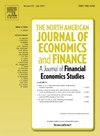绿色加密货币和非绿色加密货币对能源市场的影响:来自地缘政治风险和高阶时刻连通性的证据
IF 3.9
3区 经济学
Q1 BUSINESS, FINANCE
North American Journal of Economics and Finance
Pub Date : 2025-08-21
DOI:10.1016/j.najef.2025.102527
引用次数: 0
摘要
由于在采矿过程中大量使用能源,加密货币市场对能源市场产生了重大影响。本研究通过使用tpv - var连通性方法分析了绿色和非绿色加密货币市场对传统和清洁能源市场的影响。此外,还研究了高阶矩连通性。实证结果表明,加密货币与能源市场之间存在时变的连通性,极端事件可以强化这种连通性。非绿色加密货币与能源市场之间波动溢出和收益不对称的传导更为明显,而绿色加密货币与能源市场之间发生极端事件的概率更高。能源市场是净冲击接受者,而加密货币在各阶矩连通性上主要是净冲击发送者。地缘政治行为的影响大多是负面的,地缘政治威胁对偏度的缓和影响在绿色和非绿色加密货币之间是不同的。这项研究有助于更深入地了解绿色和非绿色加密货币对能源市场的影响,这对投资者和政策制定者具有重要意义。本文章由计算机程序翻译,如有差异,请以英文原文为准。
The impact of green cryptocurrency and nongreen cryptocurrency on energy markets: Evidence from geopolitical risk and higher-order moment connectedness
Cryptocurrency market has a significant impact on energy markets due to the intensive usage of energy in the mining process. This study analyzes the impact of green and nongreen cryptocurrency markets on traditional and clean energy markets by using a TVP-VAR connectedness approach. Moreover, the higher-order moment connectedness is investigated. The empirical results show that there is a time varying connectedness between cryptocurrency and energy markets and extreme events can intensify the connectedness. The transmission of volatility spillover and return asymmetry is more obvious between nongreen cryptocurrency and energy markets, while the probability of occurring extreme events is higher between green cryptocurrency and energy markets. Energy markets act as the net shock receiver, while cryptocurrencies are mainly the net shock transmitters in each order moment connectedness. The impact of geopolitical acts is mostly negative and the moderating impact of geopolitical threats on skewness is different between green and nongreen cryptocurrencies. This study significantly contributes to a deeper understanding of the impacts of green and non-green cryptocurrencies on energy markets, which has significant implications for investors and policymakers.
求助全文
通过发布文献求助,成功后即可免费获取论文全文。
去求助
来源期刊
CiteScore
7.30
自引率
8.30%
发文量
168
期刊介绍:
The focus of the North-American Journal of Economics and Finance is on the economics of integration of goods, services, financial markets, at both regional and global levels with the role of economic policy in that process playing an important role. Both theoretical and empirical papers are welcome. Empirical and policy-related papers that rely on data and the experiences of countries outside North America are also welcome. Papers should offer concrete lessons about the ongoing process of globalization, or policy implications about how governments, domestic or international institutions, can improve the coordination of their activities. Empirical analysis should be capable of replication. Authors of accepted papers will be encouraged to supply data and computer programs.

 求助内容:
求助内容: 应助结果提醒方式:
应助结果提醒方式:


